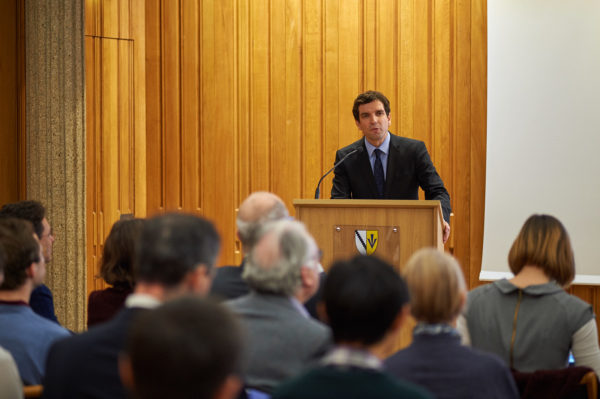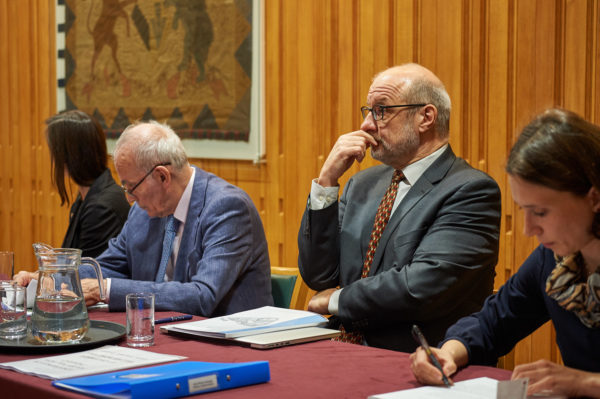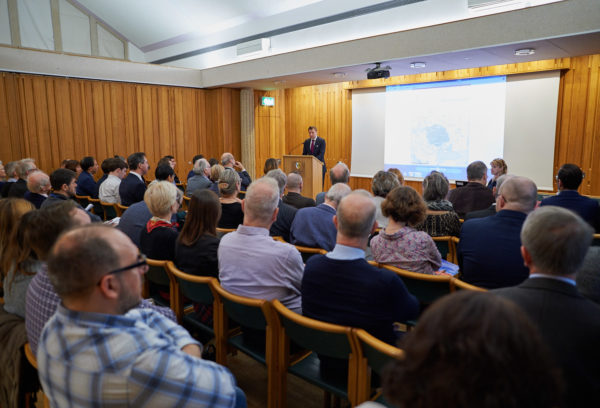Polish political thought in the twentieth century developed in very specific circumstances. From the beginning of the century, Polish political ideas were shaped by the gravest threats to the very existence of a Polish polity or state. In this highly-pressurised environment, Polish political thinkers conceived the world in unusual and often innovative ways. In a recent conference at the University of Cambridge co-organised by Polish Ambassador Arkady Rzegocki and Cambridge’s Lecturer in Polish Studies Stanley Bill, a diverse group of scholars from Poland, Britain and the United States discussed the extraordinarily rich heritage of Polish political thought in the twentieth century and its continued relevance today. Original Polish political ideas have offered a wealth of practical and theoretical inspirations to the rest of the world, and the intention in organising the conference was precisely to discuss these ideas in the most international context.
From the chaos of the First World War and the disintegration of empires, Poland regained its independence in 1918. In the first part of the conference, speakers discussed some of the political strategies that led to this watershed moment in Polish history and their continued influence in the interwar period in the contest between the opposing visions of Józef Piłsudski and Roman Dmowski. Richard Butterwick-Pawlikowski of University College London and Adam Balcer of the Centre for East European Studies at the University of Warsaw pointed to the ongoing legacy of the Polish-Lithuanian Commonwealth and the ‘republican’ tradition in Polish thought. Marek Kornat from the Institute of History of the Polish Academy of Sciences assessed Roman Dmowski’s vision of the new Europe after the First World War, presenting this controversial figure as a promoter of the sovereignty of small nations in Central and Eastern Europe.
After the terrible destruction of the Second World War, Poland found itself under Soviet control, so that any political thinking was severely restricted by Marxist ideology. In the second part of the conference, speakers examined the development of independent political ideas in opposition to the communist system in several different milieux. The Hungarian poet George Gömöri spoke of his own experience in 1956, underlining the influence of Polish literary writers on the Hungarian Revolution. The Director of the School of Slavonic and East European Studies at University College London Jan Kubik described the important role played by a group of world-renowned Polish sociologists in helping young intellectuals to find independent paths away from Marxist orthodoxy in the 1960s and 1970s. Elżbieta Ciżewska-Martyńska, a Visiting Fellow at Princeton University, analysed the strongly ‘anti-political’ leanings of Polish dissidents in the 1970s and 1980s, including the Solidarity movement. Editor Dariusz Karłowicz then led a discussion that emphasised the impact of wartime destruction and social disintegration on the later course of Polish political ideas.
The concluding section of the conference brought all these diverse threads together in a discussion of political ideas in Poland since 1989, connecting the visions of the past to the evolving context of the present. Aleks Szczerbiak from the University of Sussex asked whether or not Poland’s re-emergence as an independent democracy might stand as an exemplary model of transition for other countries. Brian Porter-Szűcs from the University of Michigan-Ann Arbor presented a theory of the continuing influence of national communism on contemporary Polish politics. Ewa Ochman from the University of Manchester described the transformation of the commemorative landscape in post-1989 Poland, explaining various controversies around Soviet war memorials in Polish cities. A lively debate followed on the role of ‘historical policy’ in Poland and other countries.
In all these discussions of past and present, it became apparent that Poland’s political history is very much alive today. Ideas from the past continue to be adapted and applied by contemporary thinkers and politicians, so that the heritage of the Polish-Lithuanian Commonwealth, the Romantic tradition, Positivism, the conflicting visions of Piłsudski and Dmowski, and even certain aspects of the communist legacy are all present within diverse political programmes and debates in contemporary Poland. As the world changes at an increasingly rapid rate, we must recognise the constant return of an often painful history in and through politics.
Stanley Bill (University of Cambridge)
The conference ‘Polish Political Thought in the Twentieth Century and Today’ took place on 8 December 2016 at Sidney Sussex College, University of Cambridge.
More information about Polish Studies at Cambridge is available on the programme website: http://www.mml.cam.ac.uk/polish













![Czy to możliwe? Laxton Hall po raz szesnasty! [ZDJĘCIA]](https://www.tydzien.co.uk/wp-content/themes/LondonLive/thumb.php?src=/media/2024/06/Głowne-zdjęcie-do-artykułu-nr-3-600x400.jpg&w=95&h=74&zc=1&q=100)



